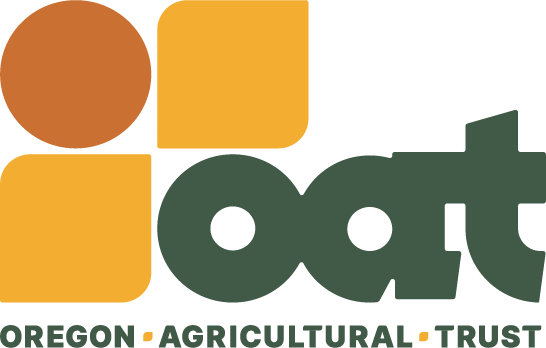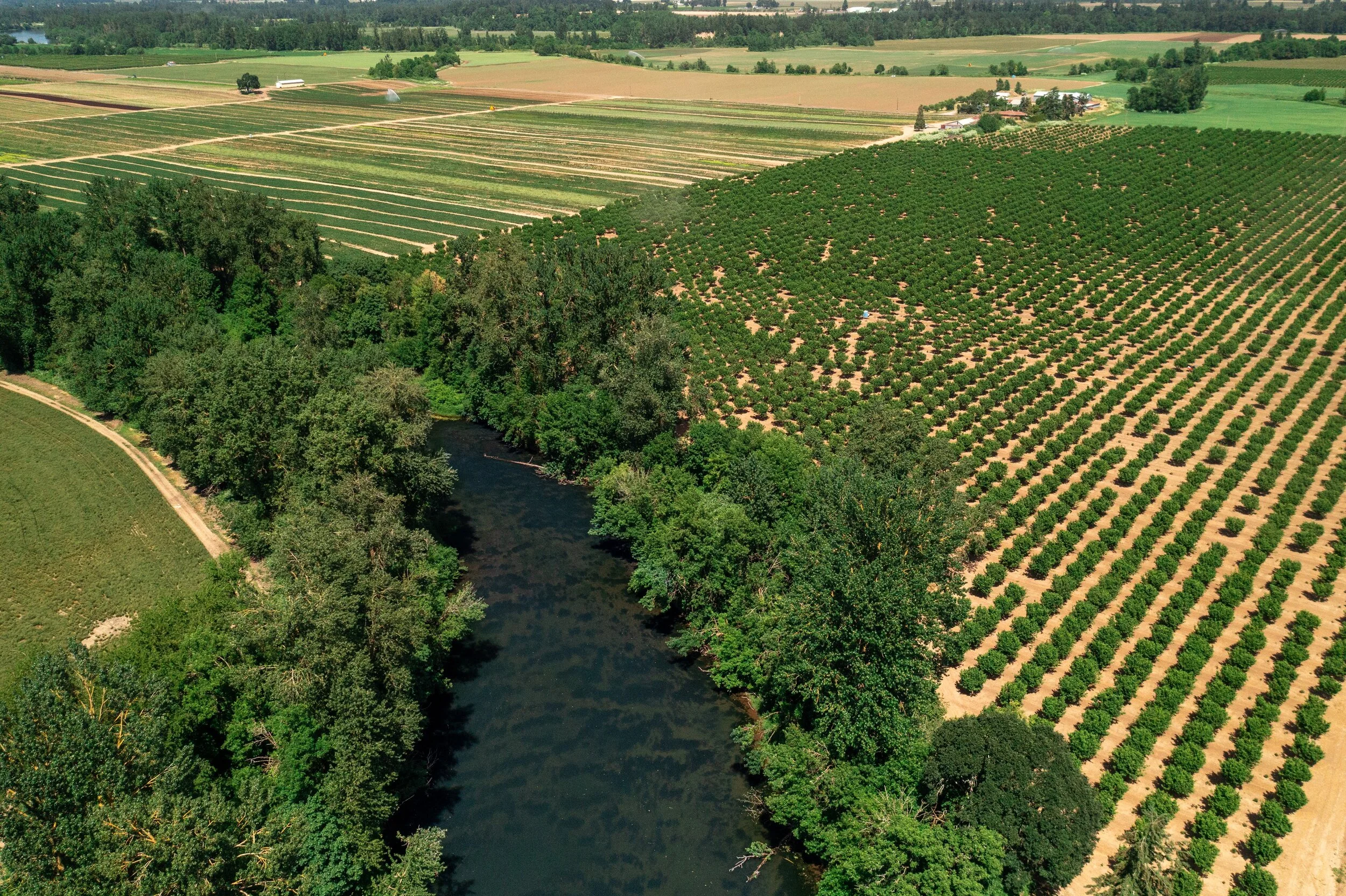OAT’s Communications Administrator, Cynthia Lopez sat down with OAT board member and General Manager of Wilson Cattle Company, Zach Wilson, to learn more about what it means to be a 6th generation rancher and how his family stewards the land. In the first installment, Zach talked about the education that’s been most valuable to him, from working on The Hill in DC to ranching in Hawai’i and New Zealand, to learning context about ranching decisions from his 90-year-old grandfather. In this second installment, Zach shares his views on how working land easements can be a win-win for both conservation and ranching. *
CL: Can you describe your experience with easements on ranch land?
ZW: We have about 10,000 acres up in Wallowa County, and one of our partners has another 12,000. When we were looking at purchasing that ground, we started working with The Nature Conservancy. They wanted to protect the region with easements but were struggling a little bit to get buy-in from the local community. They're trying to preserve the Zumwalt Prairie, which is one of the last native prairie grounds in the country. When we were looking at the property to purchase, we started talking with them and seeing how it would work. That conversation went on for a year and a half or two years. And when we all felt comfortable with what we were doing, we inked a deal. We were and are very happy with this because rather than having grazing management practices based on rigid, preconceived, standards they’re outcome based. We and the Nature Conservancy are able make decisions based on what we’re both seeing, rather than something predetermined.
So it allowed us the opportunity to show how our grazing management practices preserve and regenerate the prairie and it allowed Nature Conservancy to tell their donors and their partners, hey, we're working with cattle operators that have the same goals that we do in terms of the preservation of the prairie. We have, as I said, outcome-based management practices that they've agreed to, and that we've agreed to. And every year we sit down and talk to them and say, Okay, here's where this worked, here's where this didn't work, here's where we can improve. And - we would not do this anyway – but part of the easement prevents us from developing that ground beyond grazing. We're not going to put up any wind turbines, we're not going to develop it into some sort of vacation mecca. It's going to preserve that chunk of the Zumwalt Prairie into perpetuity.
One of the things that I see as a very high potential value of conservation easements is from the cashflow aspect. While we cashflowed the ranch purchases without the easement, an operation that didn’t have the resources that we do could use the easement in that manner. I find this to be very huge in terms of generational passdown of property.
CL: Can you talk about challenges in an easement process?
ZW: I don't say challenge like it's a negative thing. Challenges only make you better. And one of those is getting on the same page in terms of management practices with The Nature Conservancy, because they are not an organization of ranchers. Their job is to preserve the ecosystem and the environment. And our job is to show them how our management practices seek to do exactly what they're trying to do.
Really, it's a challenge in communication, because they might not understand why we do our management practices. So it's communicating what we're doing and showing with data that what we're doing aligns with their goals and their funders’ goals.
CL: Do you think easements can make it easier for a ranch to be passed on over generations?
ZW: Undoubtedly. I think that easements may be one of the most underutilized financial mechanisms for generational pass down. I think that if you have a next generation that really wants to come back to the operation, a lot of the time due to agriculture being an industry with such a thin margin, cash flow doesn't always exist. Perhaps you don't have a relationship with a lender who is thinking very long term. So what easements allow is for that next generation to come in and be able to buy out the previous generation, without having to whack up the property and sell chunks off.
I think it's something that in certain circles gets a lot of negative press. Like, “You're letting someone come in and dictate how it's going to be done on your place?” Well, no. If it's done right, everyone should be working toward the same ends. I think the more education there is about what easements actually are, [people will see that] there's nothing but upside for them when it comes to being a mechanism for that multi-generational pass down.
CL: What advice would you have for a rancher considering an easement on their property?
ZW: I would say patience, because typically the organization that has the means to provide an easement - they're not ranchers, they're not farmers. So it really is walking them through what you do, why you do it, what its impacts are. That communication, and that patience with communication, is the best advice I can give. Because ultimately if you can get through the process, all parties will be better off.
CL: It seems like a lot of it is finding the right match, the right easement holder. Did you go directly, for example, to the Nature Conservancy?
ZW: Right. They already had a mission out there, and that was to preserve the Zumwalt Prairie. We're grass harvesters, so we wanted to preserve the prairie too. We've talked to organizations about other places where those goals didn't align. Where they wanted to see certain management practices that we couldn't do or that we felt weren't going to be beneficial to the land, ultimately.. And that's fine, you know, no hard feelings. There's absolutely nothing wrong with that.
CL: I wondered if there's anything you can share regarding what's made it possible for your ranch to be passed on through several generations?
ZW: Well, I mentioned that part of coming back to our operation was going somewhere off the family business for a while. I think that's very imperative. I think that there are too many operations that rely on their children immediately coming back or that being the expectation from birth. Well, what if they don't want to do that? That can really tank an operation. So I think that giving that next generation the opportunity to go out and decide for themselves if this is what they really want to do.
The next level is having a very, very open and honest dialogue between the generations. The older generation saying this is where we're at financially. This is what the deal is. And then that next generation saying, Okay, this is what we want to do, this is what we want to see. Open and honest dialogue is key to that.
CL: Could you talk about what you love about ranching in Oregon?
ZW: It’s funny, when I was on the East Coast, there was definitely a stereotype of what ranching is and the type of person that's a rancher. One of the great things about ranching in the Pacific Northwest and Oregon in general is that we're not the Texas rancher, we're not the Kansas rancher; we're a little different out here on the left coast.
It gives us some insight into what the consumer is going to want next. There's no bigger culinary mecca than Portland, Oregon. And what we saw coming out of Portland 10,15, 20 years ago is kind of what we're seeing as sort of the average nationally now. So one of the things I love about ranching in Oregon is being able to get ahead of the game in terms of what that end consumer is going to want out of that product. And it's made us better operators because of it.
The other thing is, Oregon's a beautiful state, and it's great to ranch in a beautiful state.
CL: Is there anything you would change about ranching as it is now for you?
ZW: Oh, access to capital. I’ve got a lot of projects in mind that require capital!
From more of a philosophical perspective, one thing that I would like to see change - and I think we're getting better at it as an industry - is just telling our story. There are a lot of preconceived notions in our urban centers about what cattle ranchers are and who they are. A lot of times that's not the case. And it's not their fault for thinking that. We, as an industry, haven't done an effective job of telling our story. In terms of the environmental side, animal husbandry and care, and the “who is the rancher” side, I don't think we're as far apart from our urban cousins as a lot of people in this industry think we are and as our urban cousins think we are. I think we're a lot closer.
One of the few silver linings to come out of this whole COVID thing is that it's gotten a lot of people very hip to all of these telecommunication platforms. I think that's going to give us the ability to hold town halls, and farmers won’t have to drive 4 hours to Portland to go talk to customers at a retail store. Restaurateurs won’t have to drive five hours out of the middle of nowhere to see your ranch. I can go out with my iPhone and show my cattle crew moving cattle in our intensive grazing program and talk about how this is good for the land, how it’s a carbon sequestration mechanism, how it's good for the cattle, because they're getting fresh feed every two to three days. I think we have an opportunity, with the tools available, to have a much more in depth and nuanced conversation.
CL: Any thoughts on OAT’s potential impact on ranch land in Oregon?
ZW: I think OAT’s potential impact is a few things. One, I think it has a real ability to bridge that rural-urban divide, which I'm very excited about. Two, I think it has a real opportunity to help with some of the pass down issues between generations in terms of educating the generations on what needs to happen for the succession to be positive. Three, I think it has an opportunity with easements to help with that financially. So I'm excited to be a part of OAT. I think the team that is there is a stellar one. I think that the Board has a uniquely diverse set of perspectives and experiences that we can really help the team when needed.
CL: That's wonderful. Do you have anything else to add? Did I miss something?
ZW: No, the only other thing I would add is as a University Oregon grad, Go Ducks!
*This conversation has been edited for length and clarity.




